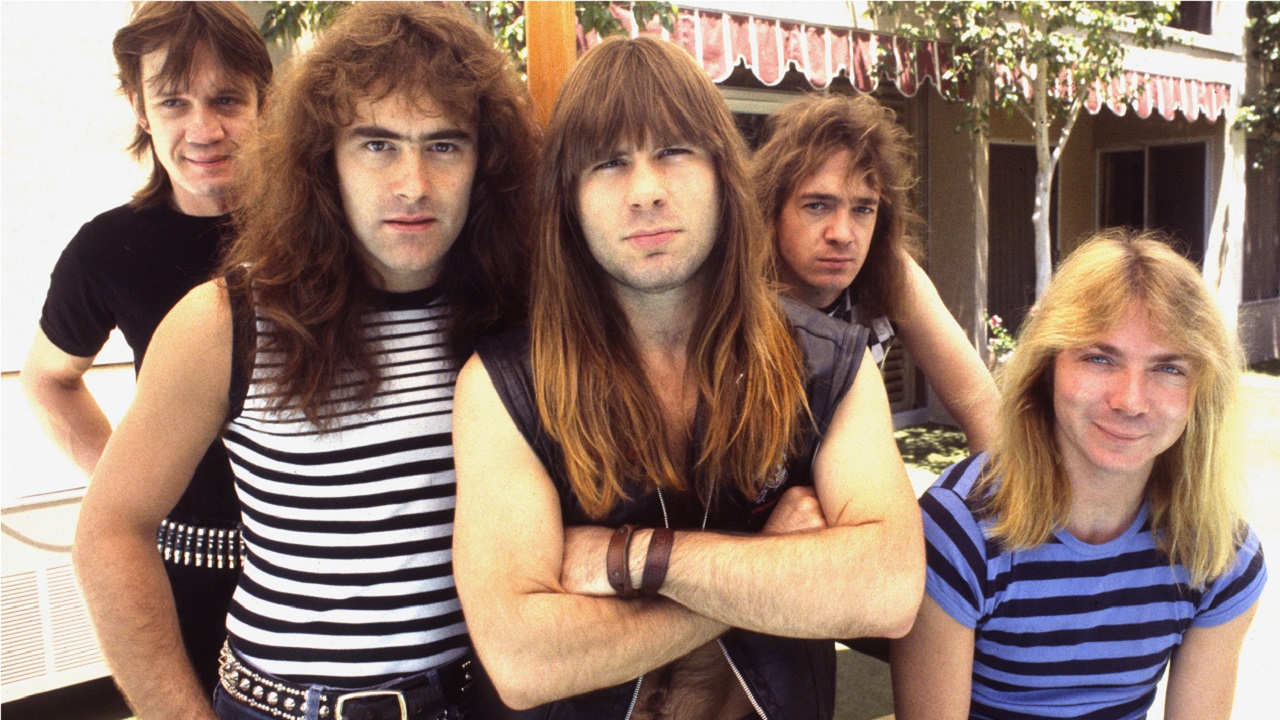After allowing themselves a day to get over their New Year hangovers, on January 2 1983, Iron Maiden took over Le Chalet hotel on the Channel Island of Jersey for six weeks. Turning the restaurant into a rehearsal room and making full use of the hotel bar (and every other pub in a 20-mile radius), here the bandmates could write, jam and party 24/7, while piecing together songs for their highly anticipated fourth album.
By all accounts, band and crew had a rollicking good time in Jersey - in 2004’s Early Days DVD, Bruce described the set-up as “24 guys with a 24-hour bar” - but the pressure must have felt pretty intense. They had to follow up The Number Of The Beast, a platinum-selling UK chart-topper and global breakthrough smash that confirmed Iron Maiden as rock royalty in the ascendant.
Even so, the continual fine-tuning of Maiden’s line-up – a process that had taken Steve Harris seven years by this point – had resulted in struggling drummer Clive Burr being dropped just three weeks earlier. Clive’s replacement, identified in the Kerrang! news pages as ‘Nico McBain’, was already a valued friend of the band, and Nicko’s thunderous force of nature brought a triple-shot of mad energy to the Jersey sessions.
Crucially, this was also the first time Bruce Dickinson was involved in the creative process. With Adrian Smith hitting his stride as a songwriter, and his guitar partnership with Dave Murray reaching new levels of fluid sophistication, Maiden were going into album number four with the full participation of their peerless definitive line-up, one that would remain intact for seven years and produce some of the biggest and best albums and tours in heavy metal history.
But that was all in the future in January ’83 and on that freezing stretch of coastline in the English channel, the band were making the most of their newfound clout. While in Jersey, the boys also commandeered the 900-year-old stately home St Ouen’s Manor, for a very different sort of Maiden photoshoot.
In the grand hall of this sumptuous country house, seated at an aristocratic dining table, the bandmates are served a human brain on a silver platter. Initially this was to illustrate the album’s original title, Food For Thought. Perhaps that just didn’t sound metal enough though, as the title soon switched to the snappy pun that we all know and love (“I still don’t know if it’s that good, but it worked,” said manager Rod Smallwood in the Early Days DVD).

If the photo from the shoot wasn't evidence enough that these East End urchins were now living the high life, band and crew soon left Jersey for the tropical paradise of Nassau in the Bahamas. No more London backstreet studios for these boys; Piece Of Mind marked the beginning of a long and fruitful relationship with Nassau’s Compass Point Studios (they returned to do Powerslave, Somewhere In Time and The Final Frontier), and a personal attachment that eventually saw Steve and his family move to the island.
Behind the mixing desk once more was veteran knob-twiddler Martin Birch, whose smooth, muscular precision engineering gifted the strongest Maiden line-up their strongest production yet, a big-league sound tooled for US radio, but loud and forceful enough to connect with the earthdogs, hell rats and rivetheads on a gut level.
From the strafing WWII bravado of Where Eagles Dare - a high-impact showcase for Nicko’s rhythmic capabilities - to the dusky mystique of To Tame A Land (regarded by Steve at the time as the best song he’d ever written), all of the new songs took lyrical cues from Steve and Bruce’s straining bookshelves.
Novelists Alistair Maclean and Frank Herbert were acknowledged “for the inspiration of their works”, even though the aptly named Herbert refused the band permission to name the album’s epic closer after his sci-fi saga Dune, sneering in a snooty statement “Mr Herbert does not like rock bands, especially heavy metal bands, and especially heavy metal bands like Iron Maiden.”
Consequently, Bruce would introduce the song onstage with an equally terse statement: “Mr Herbert, as it turns out, is a bit of a cunt actually”.
Hard to imagine what Alfred, Lord Tennyson would make of Maiden, but the Victorian poet laureate’s 1854 Crimean War poem The Charge Of The Light Brigade inspired the immersive lyrics of The Trooper - arguably the band’s signature song, the apotheosis of the galloping bass and twin-axe attack that Maiden made industry standards.
Bruce’s dynamic evergreen Revelations quotes a 1906 GK Chesterton hymn while incorporating motifs from occultist philosopher Aleister Crowley, while Flight Of Icarus sees the singer giving a teenage rebellion twist to the Greek myth of the doomed aviator.
Quest For Fire was a 1911 novel before being loosely adapted for cinema in 1980; Die With Your Boots On references the prophecies of Nostradamus; and Sun And Steel alludes to The Book Of Five Rings, a seventeenth century martial arts treatise by samurai warrior Miyamoto Musashi.
Still Life’s origins are harder to pin down; it bears traces of Ramsey Campbell’s The Inhabitant Of The Lake, Clark Ashton Smith’s Genius Loci and the Dead Marshes section of Lord Of The Rings. Whatever its literary wellspring, Still Life is one of Maiden’s most underrated tunes, an atmospheric ghost story with a dramatic sense of narrative power and melodic elegance; no wonder Opeth named an album after it in 1999.
Significantly, this focus makes Piece Of Mind the first Maiden album with no contemporary themes whatsoever. Having launched their career bathed in urban aesthetics, with Eddie lurking in sodium-lit back-alleys and lyrics about street crime and dodging rozzers, Maiden now rooted themselves firmly in the vanguard of escapist fantasy, focusing wholly on historical, mythological and literary subject matter.
In 1983, the notion of metal’s working-class ‘street cred’ was largely being outsourced to the burgeoning thrash scene; albums like Piece Of Mind - alongside Dio’s Holy Diver, Manowar’s Into Glory Ride, Mercyful Fate’s Melissa and Queensrÿche’s debut EP - followed a more Dungeons & Dragons trajectory, opening up a dichotomy that would deepen as the ’80s marched on.
With such an aesthetic shift in such a small space of time, little wonder Piece Of Mind faced something of an initial backlash from Di’Anno-era fans – especially when the harmony-laden Flight of Icarus was chosen as advance single.
“A shameful example of a band deteriorating at the same rate as the readies are rolling in,” was the assessment of an ex-fan in the Kerrang! letters pages, while Garry Bushell’s review for Sounds magazine dubbed it “a preposterously vacuous metal-by-numbers plod that could have been penned by any number of MOR-conscious metal combos”.
This song had already triggered tension between bassist and singer, with Steve trying to beef up the weight and tempo and Bruce determined to maintain the rock-steady beat. Bruce’s instinct was rewarded when Icarus entered Billboard’s top ten, but they played it Steve’s way live.
Although generally well received, press reaction was guarded; Bushell concluded that despite its “rock-solid ring of confidence” it wasn’t as good as TNOTB, while Dante Bonutto in Kerrang! cautiously judged it “Generally good, sometimes great, though marred once or twice by an almost perverse pursuit of the downright mediocre”.
Both reviews flag up Quest For Fire as a weak link, and this is still invariably the one track that proves a sticking point when considering POM’s status as a perfect ten. With a chorus sounding more school assembly singalong than raucous headbanger, Steve’s lyric places dinosaurs alongside humans in a notoriously risible first line - perhaps a tad gauche, but on the quiet Quest For Fire has a wholesome innocence and charm that makes it downright adorable.
However, in Bushell’s ludicrous, lonely opinion, “the album’s one embarrassing moment” was Bruce’s Revelations, “a dull and strained stop-start affair” apparently. Perhaps Garry had some specific personal beef against the frontman at the time (his review notes that he was “severely tempted to launch into a tirade against the increasingly dominant stamp of the Dickinson”), because Revelations is in fact an elegant and sublime mini epic, long since bedded in as a much-loved fan favourite and highlight of the live set.
Back in ’83, though, the highest critical praise was reserved for Die With Your Boots On, singled out by Bonutto as the album’s standout track, “Bruce submitting his finest vocal performance of the album”. A live staple until 1991, this rollicking self-empowerment anthem hasn’t been played since 2005, and we need it more than ever right now.
Falling between their 1982 breakthrough and their mid-80s global conquest, Piece Of Mind can tend to get unfairly overlooked. In 1983 it was voted not just album of the year but best album of all time by Kerrang! readers and its flat-out all-round mastery of craft can still take the listener by surprise, while Steve Harris still regards it as a personal favourite.
Changes were rung; New boy Nicko nailed his rhythms with power, focus and finesse, and even got an unprecedented spoken word section, warning the literal-minded religious zealots who had accused Iron Maiden of leading kids into Satanism not to meddle with things they don’t understand (backwards, natch).
Eddie was shorn of his messy locks, lobotomised and confined in an airborne padded cell, and every piece was in place to secure the future of Iron Maiden as the greatest heavy metal band of all time.

